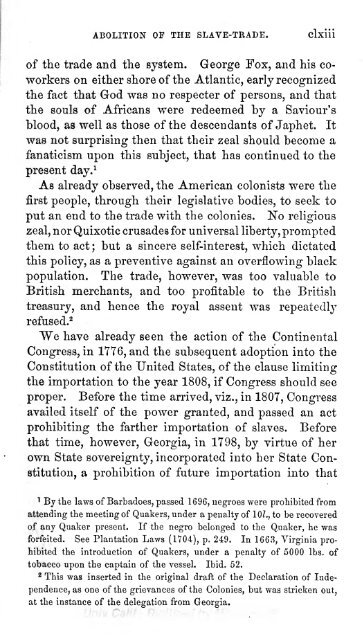Untitled - African American History
Untitled - African American History
Untitled - African American History
You also want an ePaper? Increase the reach of your titles
YUMPU automatically turns print PDFs into web optimized ePapers that Google loves.
ABOLITION OF THE SLAVE-TRADE. clxiii<br />
of the trade and the system. George Fox, and his co-<br />
workers on either shore of the Atlantic, early recognized<br />
the fact that God was no respecter of persons, and that<br />
the souls of <strong>African</strong>s were redeemed by a Saviour's<br />
blood, as well as those of the descendants of Japhet. It<br />
was not surprising then that their zeal should become a<br />
fanaticism upon this subject, that has continued to the<br />
present day. 1<br />
As already observed, the <strong>American</strong> colonists were the<br />
first people, through their legislative bodies, to seek to<br />
put an end to the trade with the colonies. E"o religious<br />
zeal, nor Quixotic crusades for universal liberty, prompted<br />
but a sincere self-interest, which dictated<br />
them to act ;<br />
this policy, as a preventive against an overflowing black<br />
population. The trade, however, was too valuable to<br />
British merchants, and too profitable to the British<br />
treasury, and hence the royal assent was repeatedly<br />
refused. 2<br />
We have already seen the action of the Continental<br />
Congress, in 1776, and the subsequent adoption into the<br />
Constitution of the United States, of the clause limiting<br />
the importation to the year 1808, if Congress should see<br />
proper. Before the time arrived, viz., in 1807, Congress<br />
availed itself of the power granted, and passed an act<br />
prohibiting the farther importation of slaves. Before<br />
that time, however, Georgia, in 1798, by virtue of her<br />
own State sovereignty, incorporated into her State Con-<br />
stitution, a prohibition of future importation<br />
1<br />
into that<br />
By the laws of Barbadoes, passed 1696, negroes were prohibited from<br />
attending the meeting of Quakers, under a penalty of IQL, to be recovered<br />
of any Quaker present. If the negro belonged to the Quaker, he was<br />
forfeited. See Plantation Laws (1704), p. 249. In 1663, Virginia prohibited<br />
the introduction of Quakers, under a penalty of 5000 Ibs. of<br />
tobacco upon the captain of the vessel. Ibid. 52.<br />
2 This was inserted in the original draft of the Declaration of Inde-<br />
pendence, as one of the grievances of the Colonies, but was stricken out,<br />
at the instance of the delegation from Georgia.


